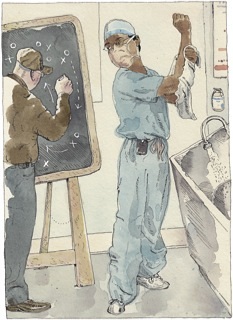No matter how well trained people are, few can sustain their best performance on their own. That’s where coaching comes in. Read more http://www.newyorker.com/reporting/2011/10/03/111003fa_fact_gawande#ixzz1ZRt7mk7TDr. Sharon Friesen - Why should we focus on engagement?
It is how people learn best, a requirement for society,a factor in school success, it is in our hands. Students need to make connections, see patterns. A sudden epiphany - fosters motivation. Engagement leads to intrinsic motivation; engaged students learn more. Learning how to learn; learning how to live ethically and respectfully. Students need to be able to solve real problems; to know they can make a difference in their world The role of teacher is more important than family background. Engagement is hard fun. (Dr. Friesen spoke at the Tell Them From Me symposium September 26, 2011)Five characteristics of an effective 21st-century educatorhttp://www.eschoolnews.com/2011/09/09/five-characteristics-of-an-effective-21st-century-educator/print/
One of the most common responses from readers was that 21st-century educators must be lifelong learners … and should be willing to learn not only from their peers, but from their students as well.
Assessment
We are working with the last seven elementary schools to learn Teacher Logic and the elementary report card system.
Condor - Thursday, September 29th at 11:30
Aurora - Thursday October 6th at 3:30
Breton Elementary - Wednesday, October 12th at 3:30
Caroline - Monday, October 17th at 3:30
Eldorado and DCS - Tuesday, October 18th at 8:15
Pioneer?
Student Involved Assessment
www.2Learn.ca
Professional Development for Teachers: Elluminate WebinarsWebinar: Exploring Entrance and Exit Passes
October 5, 2011 (4:00 - 5:00 p.m.) with Daryl Jones for Educators (Divisions 1 and 2)Looking to do more with online interactives? In this session we will explore how we can use entrance and exit passes to ensure your students are taking the essential information from the sites they visit.
Registration Closes: October 3, 2011 @ 4:00 p.m.
Webinar: Explore Your Digital Presence
October 13, 2011 (4:00 - 5:00 p.m.) with Jocelyn Littlefair for Educators (Divisions 1 - 4)Explore Digital Presence and resources on the 2Learn.ca website with the 2Learn.ca Provincial Team. There are so many new resources available to help integrate technology into your Program of Studies, while exploring the positives, negatives and need-to-know about Digital Presence.
Registration Closes: October 11, 2011 @ 4:00 p.m.
Webinar: Copyright and Ownership
October 12, 2011 (4:00 - 5:00 p.m.) with Jocelyn Littlefair for Educators (Divisions 1 - 4)Copyright matters! And never more than in a 21st century teaching and learning environment, where teachers need to model appropriate use of online digital resources. In this session, we will explore the complexity of copyright and ownership as it relates to teacher preparations and the posting of student interactions and creations. Specifically, we will address issues in responsible resource use - images, text, audio and video - with teachers and students in mind. General guidelines and online resources will be provided to assist teachers in planning activities for students with forethought and a greater understanding of the underlying need to honour copyright and ownership. Registration Closes: October 10, 2011 @ 4:00 p.m.
In the medical profession,treatment is tailored to individual patient needs; at times, more than one intervention is needed to effectively treat a patient. Similarly, educators need to test mixes of intervention elements to find the ones that work best for students with different needs. E F F E C T I V E S T R AT E G I E S T O I M P R O V E
W R I T I N G O F A D O L E S C E N T S I N M I D D L E
A N D H I G H S C H O O L SBy Steve Graham and Dolores Perin http://www.all4ed.org/files/WritingNext.pdfAssessment Principles for Fair Student Assessment Practices for Education in Canada, developed by the Joint Advisory Committee, Centre for Research in Applied Measurement and Evaluation, at the University of Alberta Galileo
Real-life examples of inquiry being used In classrooms and schools, that you might use in your own classroom.
http://www.thirteen.org/edonline/concept2class/inquiry/demonstration.html
Smart learning
The question is, if we want all students to develop their learning power, under what conditions do students learn most effectively? Do they all learn the same way? And, a pertinent question for teachers is, how would they fare as a learner in their own class?
http://leading-learning.blogspot.com/2007/10/how-to-engage-students-advice-from.html
Provincial Achievement Test results and Accountability Pillar Survey results are available to administrators on the Extranet. I hope your staff will have some time on September 23rd to begin looking at this data. GalileoAlberta Education http://education.alberta.ca/admin/aisi/themes/inquiry.aspxEffective inquiry is more than just asking questions. Inquiry-based learning is a complex process where students formulate questions, investigate to find answers, build new understandings, meanings and knowledge, and then communicate their learnings to others. In classrooms where teachers emphasize inquiry-based learning, students are actively involved in solving authentic (real-life) problems within the context of the curriculum and/or community. These powerful learning experiences engage students deeply. Assessment
Classroom assessment is changing! http://www.teachers.ab.ca/Publications/The%20Learning%20Team/Volume-14/Number2/Pages/Assessment.aspxNew research into how the brain works and how students learn best has helped educators rethink the purpose of classroom assessment and how to make it more effective. Educators today know that assessment is a process of gathering evidence of student learning. It is not limited to a single event; rather, it consists of a series of events that take place over time. Although assessment may include formal tests, it more often involves different ways of obtaining feedback on work in progress. Assessment today is less focused on marks and more focused on learning. It involves students at all points along the way. Smart Learning Information Inquiry Approaches to Information and Communication LiteracyThe 8Ws of Information and Communication from Virtual Inquiry Slempie!! Check out my new post on Blogging: How to get started. If you want help figuring out how blogging can work for your class contact me and I will gladly come out and give you a hand with planning. http://wrsdtech.weebly.com/pick-of-the-week.html
" The fact is that given the challenges we face, education doesn't need to be reformed -- it needs to be transformed. The key to this transformation is not to standardize education, but to personalize it, to build achievement on discovering the individual talents of each child, to put students in an environment where they want to learn and where they can naturally discover their true passions." -Ken Robinson Galileo Isidore Rabi, winner of a Nobel Prize for physics, was once asked why he became a scientist. He replied:
“My mother made me a scientist without ever knowing it. Every other child would come back from
school and be asked, ‘What did you learn today?’ But my mother used to say, ‘Izzy, did you ask a good
question today?’ That made the difference. Asking good questions made me into a scientist.”Smart learningCaine and Caine's (1994) Mind/Brain Learning Principles for the principles with brief descriptions, the longer descriptions, or to Caine's Website for a diagram. The principles are: - The brain is a complex adaptive system.
- The brain is a social brain.
- The search for meaning is innate.
- The search for meaning occurs through patterning.
- Emotions are critical to patterning.
- Every brain simultaneously perceives and creates parts and wholes.
- Learning involves both focused attention and peripheral attention.
- Learning always involves conscious and unconscious processes.
- We have at least two ways of organizing memory.
- Learning is developmental.
- Complex learning is enhanced by challenge and inhibited by threat.
- Every brain is uniquely organized.
The nine brain-compatible elements identified in the ITI (Integrated Thematic Instruction) model designed by Susan Kovalik include: Absence of Threat, Meaningful Content, Choices, Movement to Enhance Learning, Enriched Environment, Adequate Time, Collaboration, Immediate Feedback, and Mastery (application level). Assessment With any decision- we must ask ourselves: am I taking the easy road that works for me right now or am I taking the more difficult road that benefits others in the future?It’s easy… to give a number, letter (grade) or descriptor to a child as a way to mark or judge the work. It’s more difficult to provide ongoing coaching, descriptive feedback and formative assessment that will improve the child’s learning. Read more at:
http://www.connectedprincipals.com/archives/3971
Elementary Schools that have not used teacher logic for their outcomes based report card need to set up a time to have Susan Campbell and myself work with their teachers. This session takes about 1 hour. It will need to be done before or after school or at noon. We are not available on September 23 or October 28th.Meeting Date for Instructional Coaches Wednesday, September 14th 9:00-11:30 Division OfficeSlempie: Check out my new post on Blogging with your Students; 64 ideas for blog posts and a place to share your own using one of our google aps! Contact Carmen Slemp to learn how to make your own google form or "google it
|




